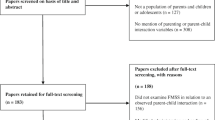Abstract
Retrospective recall about children’s symptoms is used to establish early developmental patterns in clinical practice and is also utilised in child psychopathology research. Some studies have indicated that the accuracy of retrospective recall is influenced by life events. Our hypothesis was that an intervention: speech and language therapy, would adversely affect the accuracy of parent recall of early concerns about their child’s speech and language development. Mothers (n = 5,390) reported on their child’s speech development (child male to female ratio = 50:50) when their children were aged 18 or 30 months, and also reported on these early concerns retrospectively, 10 years later, when their children were 13 years old. Overall reliability of retrospective recall was good, 86 % of respondents accurately recalling their earlier concerns. As hypothesised, however, the speech and language intervention was strongly associated with inaccurate retrospective recall about concerns in the early years (Relative Risk Ratio = 19.03; 95 % CI:14.78–24.48). Attendance at speech therapy was associated with increased recall of concerns that were not reported at the time. The study suggests caution is required when interpreting retrospective reports of abnormal child development as recall may be influenced by intervening events.


Similar content being viewed by others
References
Boyd, A., Golding, J., Macleod, J., Lawlor, D. A., Fraser, A., Henderson, J., et al. (2012). Cohort profile: the ‘children of the 90s’- the index offspring of the Avon longitudinal study of parents and children. International Journal of Epidemiology, 42, 111–127.
Cole, D. A., & Maxwell, S. E. (2003). Testing mediational models with longitudinal data: questions and tips in the use of structural equation modeling. Journal of Abnormal Psychology, 112, 558–577. doi:10.1037/0021-843X.112.4.558.
Finkel, D., & McGue, M. (1993). Twenty-five year follow-up of child-reading practices: reliability of retrospective data. Personality and Individual Differences, 15, 147–154.
Fraser, A., Macdonald-Wallis, C., Tilling, K., Boyd, A., Davey Smith, G., Henderson, J., et al. (2012). Cohort profile: the Avon longitudinal study of parents and children: ALSPAC mothers. International Journal of Epidemiology, 42, 97–110.
Golding, J., Pembrey, M., & Jones, R. (2001). ALSPAC–the Avon longitudinal study of parents and children. I. Study methodology. Paediatric and Perinatal Epidemiology, 15, 74–87.
Hardt, J., & Rutter, M. (2004). Validity of adult retrospective reports of adverse childhood experiences: review of the evidence. Journal of Child Psychology and Psychiatry, 45, 260–273.
Hardt, J., Egle, U. T., & Johnson, J. G. (2007). Suicide attempts and retrospective reports about parent–child relationships: evidence for the affectionless control hypothesis. Psychosocial Medicine, 4, 1–10.
Harlaar, N., Santtila, P., Björklund, J., Alanko, K., Jern, P., Varjonen, M., et al. (2008). Retrospective reports of parental physical affection and parenting style: a study of Finnish twins. Journal of Family Psychology, 22(4), 605–613. doi:10.1037/0893-3200.22.3.605.
Highman, C., Hennessey, N., Sherwood, M., & Leitão, S. (2008). Retrospective parent report of early vocal behaviours in children with suspected Childhood Apraxia of Speech (sCAS). Child Language Teaching and Therapy, 24, 285–306.
Kendler, K. S., Sham, P. C., & MacLean, C. J. (1997). The determinants of parenting: an epidemiological, multi-informant, retrospective study. Psychological Medicine, 27, 549–563.
Maughan, B., & Rutter, M. (1997). Retrospective reporting of childhood adversity: issues in assessing long-term recall. Journal of Personality Disorders, 11, 19–33.
McIntosh, A. M., Holmes, S., Gleeson, S., Burns, J. K., Hodges, A. K., Byrne, M. M., et al. (2002). Maternal recall bias, obstetric history and schizophrenia. The British Journal of Psychiatry, 181, 520–525.
Miller, C. J., Newcorn, J. H., & Halperin, J. M. (2010). Fading memories: retrospective recall inaccuracies in ADHD. Journal of Attention Disorders, 14, 7–14.
Morgenstern, R. D., & Barrett, N. S. (1974). The retrospective bias in unemployment reporting by sex, race and age. Journal of the American Statistical Association, 69, 355–357. doi:10.2307/2285657.
Patten, S. B. (2003). Recall bias and major depression lifetime prevalence. Social Psychiatry and Psychiatric Epidemiology, 38, 290–296. doi:10.1007/s00127-003-0649-69.
Preston, J. L., Frost, S. J., Mencl, W. E., Fulbright, R. K., Landi, N., Grigorenko, E., et al. (2010). Early and late talkers: school-age language, literacy and neurolinguistic differences. Brain, 133, 2185–2195. doi:10.1093/brain/awq163.
Sartor, C. E., Bucholz, K. K., Nelson, E. C., Madden, P. A. F., Lynskey, M. T., & Heath, A. C. (2011). Reporting bias in the association between age at first alcohol use and heavy episodic drinking. Alcoholism, Clinical and Experimental Research, 35, 1418–1425. doi:10.1111/j.1530-0277.2011.01477.
Shachar, R., & Eckstein, Z. (2007). Correcting for bias in retrospective data. Journal of Applied Econometrics, 22, 657–675. doi:10.1002/jae.939.
Watson, L. R., Baranek, G. T., Crais, E. R., Steven Reznick, J., Dykstra, J., & Perryman, T. (2007). The first year inventory: retrospective parent responses to a questionnaire designed to identify 1-year-olds at risk for autism. Journal of Autism and Developmental Disorders, 37, 49–61.
Wolke, D., Waylen, A., Samara, M., Steer, C., Goodman, R., Ford, T., et al. (2009). Selective drop-out in longitudinal studies and non-biased prediction of behaviour disorders. The British Journal of Psychiatry, 195, 249–256. doi:10.1192/bjp.bp.108.053751.
World Health Organization (1992). International classification of diseases and related health problems (ICD-10). Geneva: WHO. Retrieved from www.who.int/classifications/icd/en/greenbook.pdf p. 179.
Acknowledgments
The work of the first author was specifically funded by the Economic and Social Research Council and Medical Research Council. We are extremely grateful to all the families who took part in this study, the midwives for their help in recruiting them, and the whole ALSPAC team. The Medical Research Council, The Wellcome Trust and the University of Bristol currently provide core support for ALSPAC.
Author information
Authors and Affiliations
Corresponding author
Rights and permissions
About this article
Cite this article
Russell, G., Miller, L.L., Ford, T. et al. Assessing Recall in Mothers’ Retrospective Reports: Concerns Over Children’s Speech and Language Development. J Abnorm Child Psychol 42, 825–830 (2014). https://doi.org/10.1007/s10802-013-9819-8
Published:
Issue Date:
DOI: https://doi.org/10.1007/s10802-013-9819-8




